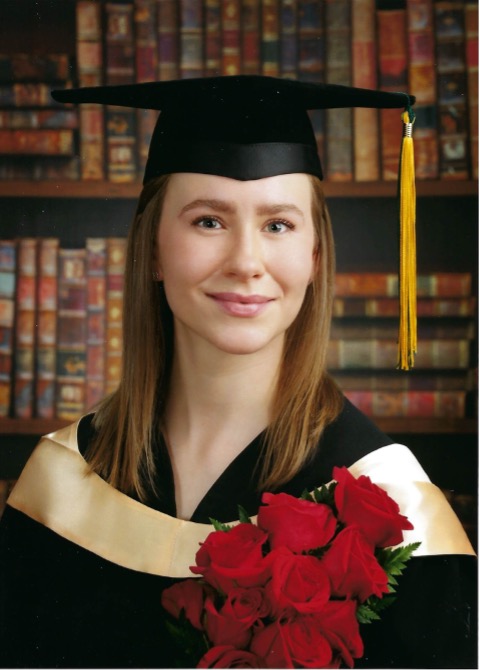Convocation Spotlight: MScPT graduate Rachel Stokes
7 June 2022

MScPT graduate Rachel Stokes (PHOTO SUPPLIED)
Rachel Stokes has had a busy few years as a physical therapy student in the Faculty of Rehabilitation Medicine. The College of Physiotherapists of Alberta’s 2021 Student Leadership Award winner has been actively involved with the Rehabilitation Medicine Students’ Association (RMSA) and the creation of the faculty’s Physical Therapy Students Association. As she gets ready to graduate with a master of science in physical therapy, we asked her to reflect on her exciting journey.
What are you most proud of from your time in the PT program?
I’m most proud of my time as the 2020-2021 president of the RMSA, as I had the opportunity to engage in some really important discussions about the future of our faculty and support for our students. I represented rehabilitation students in intra-faculty discussions regarding the academic restructuring of the university, advocated for more mental health supports for students during the pandemic and championed the prioritization of health-care students during the distribution of the first round of COVID-19 vaccinations. I also established the RMSA's Equity, Diversity and Inclusion Sub-Committee, which is responsible for advising the RMSA on the creation of inclusive and accessible events and initiatives, and representing the interests of racialized students.
I really enjoyed collaborating with students from the other Faculty of Rehabilitation Medicine programs on these initiatives. I made some great friendships with some amazing future health-care providers and had the opportunity to hone my leadership, advocacy, communication and management skills. I learned more about the roles of other rehabilitation professionals and am so grateful for the experiences we shared together.
What was the biggest challenge you faced?
Graduate programs bring a number of challenges, such as a huge volume of content and complex concepts. I felt that I was managing pretty well prior to the pandemic, but a lot of my regular routines and coping strategies had to change when public health mandates were put in place in March 2020. Managing the transition to virtual classes and labs on top of my responsibilities with the RMSA really challenged my adaptability and time-management skills. It was a really busy time in my life, and I’m proud of the resilience I showed in juggling my various roles.
What initially drew you to this area of study?
It’s a cliché, but I was so drawn by the opportunity to help people. I took sports medicine all three years of high school and then worked as a therapy assistant for five years in a private orthopedic practice during my undergraduate degree. These experiences highlighted the importance of mobility and a healthy body, and the severe impact that sore or injured joints and muscles can have on peoples’ lives. Mobility restrictions ultimately limit your ability to lead a full life, by preventing you from engaging in your chosen field of work, recreation or other activities that are important to you.
I’m so excited to have a career in a field that combines my love of anatomy and physiology, while also demanding good communication skills, critical thinking and effective teamwork. Every day is a challenge, but it’s so exciting and rewarding to know that I’m helping people create positive change in their lives and regain their independence.
What lessons will you take from pursuing a degree during the pandemic?
Everyone needs a support system. When the pandemic hit, I was living on my own in a basement apartment in Edmonton. I had no family in town, and while I had made some amazing friends in the first few months of our program, I was initially hesitant to see people as I didn’t want to contract or spread COVID. The first few weeks and months of the pandemic were incredibly isolating for me — I often went days without seeing anyone in person, and my mental health suffered as a result. I am so grateful to have friends who welcomed me into their bubble, and who I could continue to study and have fun with even when the public health restrictions were at their most severe. This experience has highlighted for me the importance of engaging patients’ friends and family members in their health and rehabilitation journey.
What comes next for you in your career?
I initially worked on a surgical and orthopedic service, and have since transitioned to a position in an acute-care medicine unit. I love how much freedom I have with my treatments now — in my experience, orthopedic and neurology units often have specific timelines, guidelines and pathways that are important to follow as part of best practices. While it’s important to apply these standards, I found they sometimes limited my creativity and critical thinking when developing treatment plans. I’m excited to have more flexibility and love working in acute care — I anticipate that I’ll spend my career trying out a number of different niche practice areas within the public health-care system.
What advice would you give to a student thinking of entering your program of study?
Explore your options! Physical therapy is such a broad and diverse field. So many people think of physical therapists as only working in private orthopedic practices, and while that’s a critical component of our profession, there are so many other areas of specialization.
Use your volunteer time or undergraduate placement opportunities to explore areas that you’ve never considered working in before, whether that’s hand therapy, organ transplants, pelvic health or cancer rehab. You’re likely to learn some helpful new skills that are applicable across specialties and gain a better appreciation for the scope of a physical therapist.